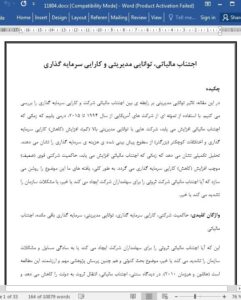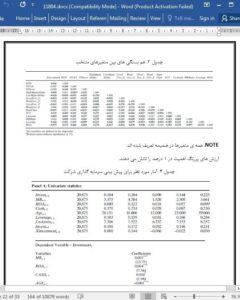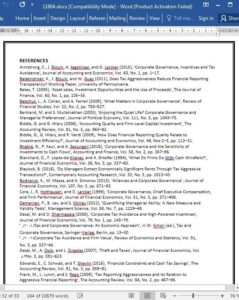In this paper, we examine the impact of managerial ability on the relation between corporate tax avoidance and investment efficiency. Using a sample of US firms from 1994–2015, we find that as tax avoidance increases, firms with high (low) managerial ability exhibit increased (reduced) investment efficiency, that is, smaller (greater) deviations from predicted levels of investment spending. Supplemental analysis also shows that as tax avoidance increases, strong (weak) corporate governance increases (decreases) investment efficiency. Overall, our findings shed light on whether corporate tax avoidance generates wealth for the firm’s shareholders or simply exacerbates agency problems.
Whether corporate tax avoidance generates wealth for the firm’s shareholders or simply exacerbates agency problems is a subject of ongoing debate and therefore an important research question worthy of study (Hanlon and Heitzman, 2010). In the traditional view, tax avoidance lowers wealth transfers to the state, enabling firms to retain greater resources and increase shareholder value (Swenson, 1999; Graham and Tucker, 2006; Wilson, 2009). However, several studies, such as Desai and Dharmapala (2006, 2008, 2009) and Desai et al. (2007), suggest that managers of firms with higher levels of tax avoidance may undertake costly activities designed to hide tax avoidance behaviour from government authorities. As a consequence, managers of these firms may produce financial statements with reduced transparency that may facilitate rent extraction, otherwise known as opportunistic behaviour, by managers. Two examples of such managerial opportunistic behaviour involve the firm’s management using the proceeds from increased levels of tax avoidance to increase firm investment beyond its optimal size (Balakrishnan et al., 2011) or failing to use the proceeds from increased levels of tax avoidance to invest in positive net present value (NPV) projects (Bertrand and Mullainathan, 2003).
CONCLUSION
To our knowledge, our paper is the first to examine the impact of managerial ability on the relation between tax avoidance and investment efficiency.
Specifically, we examine the conditioning effects of managerial ability and corporate governance on the relation between tax avoidance and investment efficiency. We document that as tax avoidance increases, firms with low (high) managerial ability exhibit greater (smaller) deviations from predicted levels of investment. In other words, we show that as tax avoidance increases, high managerial ability promotes investment efficiency, while low managerial ability exacerbates investment inefficiency. Similarly, we show that as tax avoidance increases, corporate governance is associated with investment efficiency; that is, strong (weak) corporate governance increases (decreases) investment efficiency. Nevertheless, we acknowledge that the statistical associations we document are contingent on our ability to measure the constructs of investment efficiency, tax avoidance, and managerial ability.










